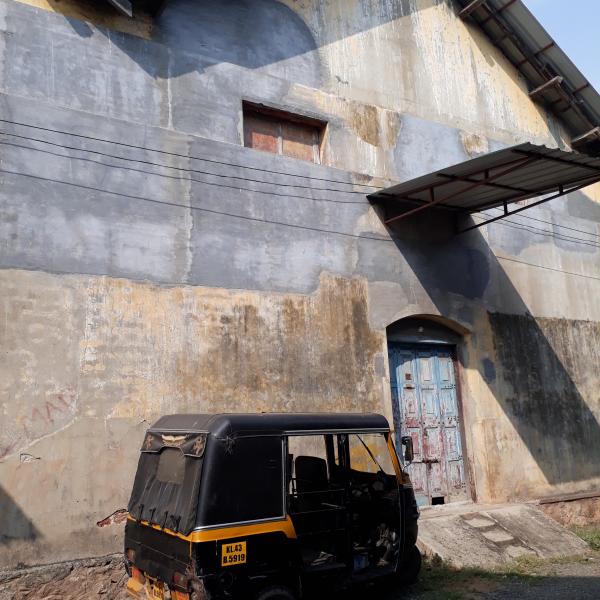
Biography
Nisha Kommattam primarily works at the intersection of South Asian literatures and Gender & Sexuality studies, with a focus on Southern India (Malayalam Literature, Kerala Studies). She is also interested in literatures of migration, inter-Asia comparisons, popular culture, and in the transnational entanglements of German writers in fin-de-siècle Europe.
In 2017, Nisha Kommattam was awarded a multi-year research grant from the Bundesministerium für Bildung und Forschung (German Ministry of Education and Research), for her project “Transnational Networks of Queerness in South Asia”. Prior to that, she held a postdoctoral fellowship at Dartmouth College and taught in the Department of South Asian Languages and Civilizations at the University of Chicago. She has also been the recipient of fellowships at the Institute for Advanced Studies (KWI) Essen, Germany, the Erich Auerbach Institute for Advanced Studies, Cologne, Germany, and the Gender Research Institute at Dartmouth College. She currently serves on the editorial board of the journal gender forum published by the University of Cologne, and has been on the board of trustees of the American Institute of Indian Studies (AIIS). Prof. Kommattam has taught classes in English, German and Malayalam to diverse student groups in the US, Germany, and Israel.
In addition to her interpretive scholarly work, she also translates poetry, fiction and non-fiction from Malayalam to English and German, and from German to English. She has also curated exhibitions of South Asian artists and published on female contemporary visual artists from South Asia and Greece.
Work with Students
Prof. Kommattam works with undergraduate and graduate students across her research and teaching interests, including South Asian literatures, Gender and Sexuality Studies, South India as a Region of Study, Kerala Studies, and translation projects.
Selected Publications
“Architecture, Art, Shelter: The Art of Zenovia Toloudi”
https://doi.org/10.37189/kwi-blog/20220523-0830
“Orte der (Zu-)Flucht: Dwelling in Aimée Ducs Roman Sind es Frauen?”
https://doi.org/10.37189/kwi-blog/20220509-0830
“Vehicles of Progress: The Kerala Rikshawalla at the Intersection of Communism and Cosmopolitanism”, book chapter in: Bourdaghs, Michael, Paola Iovene and Kaley Mason (eds.). Sound Alignments. Durham: Duke University Press, 2021.
Are They Women? A Novel Concerning the Third Sex by Aimée Duc, with Margaret S. Breen, (translation from German, with critical introduction); Broadview Press, Peterborough, ON, Canada, 2020.
Sind es Frauen? Ein Roman über das dritte Geschlecht by Aimée Duc, with Margaret S. Breen, (new edition with critical introduction); Querverlag, Berlin, Germany, 2020.
“Der Islam ist eine Religion, die die Vernunft respektiert” [Islam is a religion that respects reason] by Muhammad Abdul Khader Maulavi (1873–1932), translation from Malayalam to German, for the volume: Frey, Christiane, Uwe Hebekus and David Martyn (eds.). Säkularisierung - Grundlagentexte zur Theoriegeschichte. [A Reader on Secularization]. Frankfurt a.M.: Suhrkamp, 2020.
“Castle Wetterstein: In Context”, editing and translation of contextual materials on Frank Wedekind and his work, in: Johnston, Ian (ed.). Castle Wetterstein. Petersborough, Ont.: Broadview Press, 2019.
“Malayalam Poetry”, in: Greene, Roland (ed.). 2013. The Princeton Encyclopedia of Poetry and Poetics. Princeton: Princeton University Press, pp. 839–840.
“Boundaries and Borderlands”, in exhibition catalogue: Pritika Chowdhry. What the Body Remembers. DOVA Temporary, 2009.
Teaching
Trauma and Narrative
Queer South Asia
Queer Asia(s) 1, Queer Asia(s) 2
Kawaii (cuteness) culture in Japan and the world
Writing Between Worlds: Exile, Migration, and Diaspora
Women, Men, Sex, Empire: Fin de siècle German Sexology
The Hidden Word: Gender, Class and Trauma in Post-War Germany
Language and the Human (College Core)
